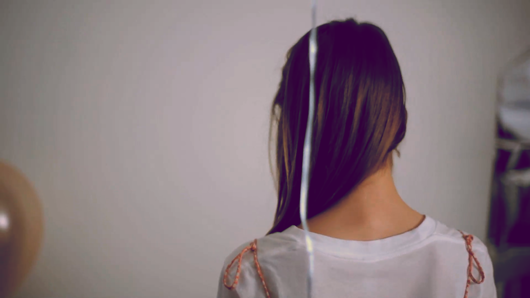Women in film: 10 things film school taught me
By Nathania Gilson
1. Be brave and step outside your comfort zone.
Part of getting your project off the ground involves doing things that might be just a little frightening. This is a good thing, I promise. Approach people whom you think normally wouldn't give you the time of day. Show someone else a script you've had sitting on your desktop for months. Take on a role you've never attempted before -- never let lack of experience hold you back. Don't wait for permission to make your film, or for someone to give you their blessing. Surprise yourself. Surprise others. Never be short of enthusiasm, for yourself, your project, and others. Accomplish things.
2. Finish things.
Always, even if it's not an easy task to get through. Imagine it, do it, finish it. Set deadlines and stick to them. Film school is good for this, even if it doesn't end up working out for everyone. Due-by dates decided by other people are often a good way to force yourself to spend time on working towards something. Remember -- a project that you can wrap up at a certain point in the year is a lot more promising than an an overly ambitious project that never really gets past pre-production. Stop worrying about perfection and focus your efforts towards something tangible that you can share with others. If you run out of money along the way, find a way to get it done without. It's okay to look back and wish you could've fixed things. Move forward. There will be a next time to try and get it right again, but it's up to you to make sure that happens.
3. Have empathy.
Everyone has their bad days, including you, and even the worst day of your week, month, or year isn't all that bad in retrospect. Cultivating the personality of a film set when you're both on and off the job is a delicate yet crucial task. Learn everyone's names and figure out what they are meant to be doing. Don't ask people to hurry up but do remind them that time is something you do need to make the most of. Think outside of your own ego, even at the lowest point in the day. Pay attention. Be generous. Help somebody learn something that they don't know about. Work with people who do things that you know nothing about for the experience. Understand what it is that they go through to achieve a finished product or vision. Use this insight to better your own approach.
Still from 'Tiny Earthquakes', a short film I wrote, directed and edited.
4. Think ahead.
Preparation is half of what gets you there, and figuring it out on the day (or in the middle of the night) isn't always a viable option. Plan. It's never too early to. Make lists, layout a schedule, anticipate what comes next, come to an agreement about what to do if something goes wrong with both yourself and the people around you. If all of these things intimidate or bore you, get someone whom you trust involved to help out.
5. Educate yourself.
Learn a new language. Figure out how people in your industry talk to each other. Master the technical terminology, even if you're not set on working in anything technically related. The more you know, the better your decision making will be. Don't always let other people make those decisions for you. Go to the library and pick out every book that catches your eye. Risk tallying up horrendous library fines. Read, watch and listen to everything you can. Find out what you like and what you don't like, and why. Find the best ways to articulate yourself. Find your own voice -- your writing, directing or editing voice, too. Pay attention to everything and everyone around you as life happens. Write it down. Draw it. Film it. Animate it. Figure out what it is that you want to say. Pin-point what it is that makes it so special and yet so universal. Make something of this.
6. Stay motivated.
Fight distraction. Fight laziness. Fight 'maybe tomorrow instead'. Remember why you're doing this to begin with. Don't give up. Yes, getting films funded is difficult and it's not always obvious whom to speak to about getting this process set in motion, but it is certainly not impossible. It is meant to be tough and challenging because if it wasn't, getting to the end of it all probably wouldn't feel so rewarding. If in doubt, remember that someone out there probably needs to hear what you have to say. Procrastination's only okay if you really like running off adrenaline. In the mean time, find a mentor to guide you along the way. This can a friend, family member, a lecturer, an industry practitioner -- anyone you look up to who has your best interests at heart but someone who will also be honest with you when you most need it.
Still from a music video I directed for Melbourne band, Love of Diagrams.
7. Think outside of the ordinary.
Get creative. Be resourceful. Money should never replace common sense. Not just with the kind of stories you want to tell, but also how to go about making them happen. Take a look at every opportunity that comes toward you, even if it doesn't make sense at first. Logic is overrated; find out what your subconscious wants to make a film about and act accordingly. Skip gimmicks, and think about what makes your story or idea worth paying attention to. Don't try to make the film that you think other people want you to make. Collaboration is an important part of creative growth, too. Involve other talented people in the work you want to make possible; they don't even have to be working in the same industry as you.
8. Get really good at something.
Accept one thing, and accept it as early on in your life as possible: you will struggle to be unequivocally talented at every single aspect of the industry you want to be a part of. Not that this should deter you from learning as much as possible about everything around you, but you'll find your calling eventually. Pick something you love; something you can obsess over and stay up all night for, and learn everything you possibly can about it for as long as you choose to practise it. Meet people who practise the art, throw yourself into situations where you get to practise it, too, ask questions and find answers at any given opportunity, and never think that you'll finally reach a point where you know and seem to have done it all. You won't, but that's the exciting bit -- being part of an industry that is ever evolving and being shaped by the people who try to sustain a career out of it.
 Another still from 'Tiny Earthquakes'.
Another still from 'Tiny Earthquakes'.
9. Do other stuff.
Spend an hour or three a day doing something that isn't related to the task at hand for the sake of your own sanity. Let your mind wander if it wants to, but avoid letting it get bored with what you have in front of you. What you do outside of your projects informs as much as what you achieve when working on them. It can be as simple as walking away from the computer to make a cup of tea or going for a walk to clear your head. Working on multiple projects at once can be a positive force as well, and something I can encourage from my own experiences of having simultaneously balanced pre-production, production, and post-production roles across more than one genre. Although hypothetically, this sounds like madness, it can be a good way to help you climb out of one creative rut by spending time building upon someone else's vision in a completely different capacity. When stuck on one project, you always have the option to step into a different role, or world, and re-focus your attention on what you need to prioritise. Sleep, too. That's important.
10. Enjoy what you do.
...Otherwise, what's the point? Work with people who inspire you and make you want to continue to get better at what it is you want to do. Instead of freaking out about where you'll end up five years from now, look forward to it. Keep working hard, you never know what could happen, or who will notice.
Nathania Gilson is a young filmmaker living in Melbourne, Australia. She has spent the last three years working on a number of short films, music videos and documentaries. Her side projects involve curating content for independent publications, adventuring and maintaining the ability to function on minimal sleep. She is excited about the future.


